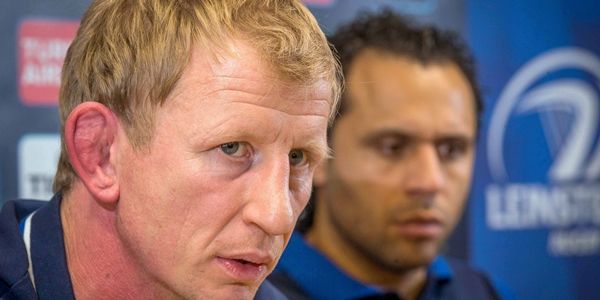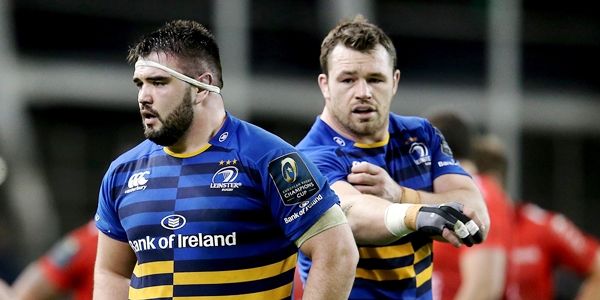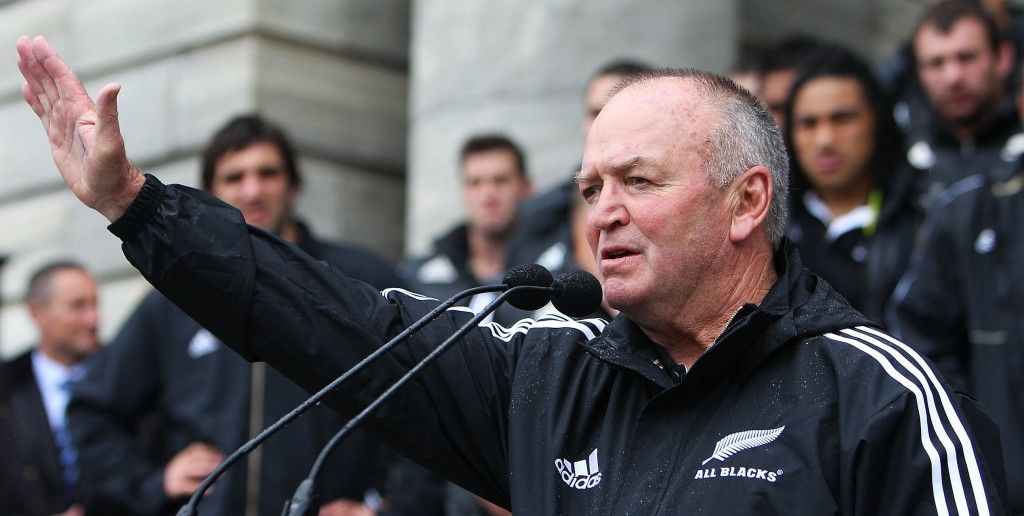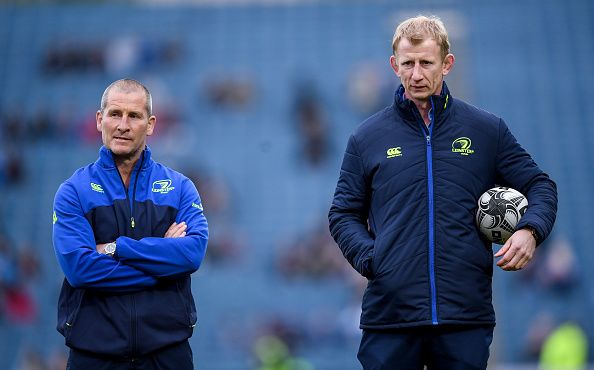When is the last time you remember Leinster being outmuscled?
The recently crowned Champions Cup champions sealed their fourth European title with a 15-12 win over Racing on Saturday, and while the scoreline reflected a close encounter in Bilbao, Leinster had more possession, territory, runs and metres made than their Parisian opponents on the day.
Interestingly, Leinster also boasted the same superiority in their 38-16 win over the Scarlets in the semi-finals and in their 22-17 pool stage win over the Exeter Chiefs.
Even in the wins when they didn’t have more possession or territory (Saracens), or where they had less runs and metres made (Montpellier), you never felt like Leinster had been outmuscled or outmatched by an opposing team in this year’s tournament.
It’s hard to imagine a forward pack with Cian Healy, Tadhg Furlong, James Ryan, Scott Fardy, Dan Leavy and Jordi Murphy being outmuscled by too many teams but not too long ago Leinster were outmuscled, outmatched and out of touch with who they were as a province.
It was during Leo Cullen’s first season in charge of Leinster and it was at one of its lowest ebbs when the club welcomed Toulon to the Aviva Stadium for round four of that season’s Champions Cup pool stages.
Leinster had lost their opening three pool games to Wasps, Bath and Toulon and they had scored just one try in over 240 minutes of rugby during that time.
Toulon came to Dublin as the three-time defending champions and they flexed their muscle and ended Leinster’s slim hopes of qualification to the knockout stages with a 20-16 win.
Leinster weren’t tough enough was Cullen’s initial diagnosis.
“Unfortunately, we allowed Toulon to play too much at us in the second half, and we did’t manage our field position particularly well,” said Cullen after the defeat.
“That power, it does pay in the end. It was a tough day for us there. A lot of really good things in the first half. Second half, we just got outmuscled.”
Here was a side that had reached the semi-finals of the Champions Cup only six months earlier under Matt O’Connor and they were now staring at a fourth consecutive defeat and the possibility of finishing bottom of their pool with a first-year coach that had seemingly been thrown in too far, too deep, too quick.
Cullen said that when he was first appointed Leinster’s head coach in August 2015 that the opportunity to take the reins of his boyhood club was too good to turn down but he later noted that he realistically got the Leinster job because no one else wanted the challenge.
“If you look at it, I think the reason I got the job, was nobody else wanted to take the challenge on, where you’re missing 16 players from the World Cup, it turned out to be 19, that’s a difficult challenge – what coach wants that?,” said Cullen nearly two years after he was first appointed head coach.
“There’s different pressure. Look at Chelsea, they won the league and (Antonio) Conte was probably under no pressure when he was coming in after the season they’d had.
“Now he’s probably under huge pressure because they overachieved.”
Conte was under pressure because he was the manager of Chelsea FC, a Premier League football club that had appointed him as their seventh permanent manager in as many years. Needless to say, pressure was always going to be a consistent theme at the South-West London club. Whether it was Antonio Conte or Alan Curbishley in charge.
Conte may have been under pressure at Chelsea in Cullen’s eyes because he was overachieving but Cullen himself was under the same pressure during his first few months as Leinster coach for quite the opposite reason – for underachieving.
Leinster’s bottom placed pool finish in the 2015-16 Champions Cup was just the second time in 21 seasons that the province had finished in last place in their European Cup pool, and as bad as that was, Cullen did salvage their season with a trip to the PRO12 final later that season.
Leinster topped the PRO12 that year with 16 wins from 22 games, they defeated Ulster 30-18 in the semi-final and they were ultimately railroaded by a Pat Lam led Connacht side in the PRO12 final in Edinburgh.
Questions were raised over Cullen’s experience then and they were questions that IRFU Performance Director David Nucifora was happy to answer.
“He’s doing a good job,” Nucifora said of Cullen in the wake of the PRO12 final defeat.
“It’s not easy coming into a head coaching position with such little experience because he is learning on the go and that can be tricky at times. He is developing and is going to develop into a really important asset for Irish rugby as a coach.
“Does he need help along the way? Possibly, but that’s up to Leinster and Leo to ask for that if they think that’s required.”
It ultimately did come down to Cullen and Leinster.
Niall Breslin once said of Cullen that he wondered if he had any other life to go to outside of rugby. He said that Cullen had an absurd level of knowledge for the intricacies of a line-out and that he would spend hours examining the finer details of every move and lift.
Breslin left Leinster in 2004. Ten years before Cullen retired from the sport and 11 years before he became the club’s head coach.
How would Cullen – this rugby perfectionist – react to the idea of assistance or outside help? Especially when the idea was being floated publicly by the IRFU Performance Director just days after he guided his team to a PRO12 final?
He embraced the idea and sought assistance from the very best in World Cup winning coach Graham Henry.
Henry was hired by Leinster the summer after the Connacht defeat as a coaching consultant and he worked directly with the players during their preseason while Cullen watched and learned.
“It’s easy for me to get somebody in from the outside, whether it’s Graham Henry or somebody else, if I think they can add to the group – and certainly Graham Henry added to the group massively because of the wealth of experience he has – and I’m comfortable knowing the direction I see the team going,” said Cullen at the time.
“I think he’s someone that can add to the group massively, because that’s what’s best for the group. If there’s other people who can add along the way, yeah, I’ll bring that to our CEO and the board and if they’re on board with the proposal, they’ll back it.
“If they back it and we both think it’s something where it can benefit the group, we can make progress along those lines.”
One of the ‘other people’ that Cullen referred to was Stuart Lancaster who joined Leinster as a senior coach in the first month of the new season.
Lancaster was hired by Leinster as a senior coach and it was his first permanent role in rugby since his dismissal as England head coach following the country’s 2015 Rugby World Cup pool stage exit.
The Leeds native was approached by Cullen before the season to see if he had any interest in coming to Leinster to replace the departing Kurt McQuilken who returned to his native New Zealand for personal reasons.
Lancaster did have interest and the rest is history. He came on board and Leinster quickly started to improve.
The province scored 60 tries in 30 games in Cullen’s first season in charge before scoring 129 tries in 31 games with Lancaster on board the following season.
It’s not a coincidence. Just ask the players.
Johnny Sexton:
“It’s not by accident that you see everyone wanting to get the ball in their hands. Stuart Lancaster has come in and had a big influence on the style of rugby.
“This is the stuff we practice every day in training, the unstructured part of our game. We spend time on our off-loading game, so it’s not by chance or a fluke – it is being worked on every day.
“Stuart has had a great influence on us and the whole organisation and it is a great place to be again.”
Jamie Heaslip:
“I don’t know what he was like [coaching England], but he has definitely brought a really good intensity and structure to training.
“He’s been a massive addition in terms of playing and behind the scenes in terms of culture and how we want to be at Leinster.
“I put him up there with [Ireland Grand-Slam winning coach] Joe Schmidt in terms of best coaches I have ever worked for.”
Jamison Gibson-Park:
“Stu has without a doubt been the best coach I’ve had. I’m in my sixth year of professional rugby now and he’s without a doubt the best I’ve had.
“He’s so good at improving the whole squad. There are guys that weren’t playing at the weekend but he’s always trying to help them.
“He drives very high standards in training and he tries to connect a bit more on a personal level I think, which is massive for some guys. When the coach is paying you a bit more attention you tend to listen more.
“Aside from the set piece attack, he is all over the attack and he works on the defence as well so he does the whole shebang.”
Lancaster has received a lot of the plaudits during his time with the province and his impact is supported by both the words of his players and the stark increase in the amount of times they’ve crossed the try line since his arrival in Dublin.
Lancaster supposedly runs the attack and the defence at Leinster while Cullen takes charge of the forwards, the mauling, the line-outs, the breakdown, the restarts and the selections, while also offering his input into the attack and the defence.
I’m still not exactly sure what a senior coach is, or how the Cullen and Lancaster dynamic really works and if we’ll see its like again, but I am sure that whatever understanding both men share it certainly is working.
How much of Leinster’s success can be attributed to the arrival of Lancaster? How much has Cullen improved as a coach since he came on board? Was the 2015-16 Champions Cup campaign a mere blip in what was an otherwise very solid season for Leinster and would Cullen have enjoyed similar success without Lancaster?
Despite all the chatter that surrounded their working relationship, Cullen and Lancaster constantly preached improvement and they reaped the ultimate reward against Racing on Saturday.
Cullen brought a European Cup back to Leinster and became the first man in history to win the tournament as both a player and also as a coach. The latter seemingly harder for him than the former.
LEINSTER HAVE DONE IT!
"Leo Cullen is in tears!"
Heartbreak for Racing right at the death, but it's the Irish side who edge the tightest of contests! pic.twitter.com/QUJmZHLGET
— Rugby on TNT Sports (@rugbyontnt) May 12, 2018
“It’s relief really,” said Cullen after the Champions Cup final win.
“Obsessed is the word we have about this tournament and to get to this stage again, it’s just very lucky that the club have been very supportive of me.”
Leinster and Nucifora were supportive of Cullen but it was ultimately his decision to reach out and bring in Henry and Lancaster into his coaching circle.
The man that studied line-outs like a scientist as a player reached out for help when he could have easily stood by a PRO12 final appearance and used it as justification that he could do his job, his way in whatever way he saw fit.
But he didn’t. Cullen and Lancaster preached improvement throughout the entire season, and like all good leaders, they asked of themselves before they asked of others.
Now they look at their team as the best side in Europe. No longer outmuscled. No longer outmatched. Just better as a group. The goal from the very start.










































